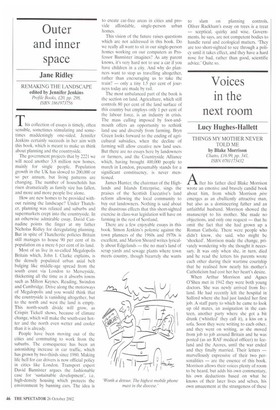Outer and inner space
Jane Ridley
REMAKING THE LANDSCAPE edited by Jennifer Jenkins Profile Books, ,f20, pp. 298. ISBN 1861973756 This collection of essays is timely, often sensible, sometimes stimulating and sometimes maddeningly one-sided. Jennifer Jenkins certainly succeeds in her aim with this book, which is meant to make us think about planning and the countryside.
The government projects that by 2221 we will need another 3.8 million new homes, mainly for single people. Population growth in the UK has slowed to 200,000 or so per annum, but living patterns are changing. The number of households has risen dramatically as family size has fallen, and more and more people live alone.
How are new homes to be provided without ruining the landscape? Under Thatcher, planning was relaxed and suburbs and supermarkets crept into the countryside. In an otherwise admirable essay, David Cannadine points the finger at my father Nicholas Ridley for deregulating planning. But in spite of Thatcherite policies Britain still manages to house 90 per cent of its population on a mere 6 per cent of its land.
Most of us live in so-called Megalopolis Britain which, John I. Clarke explains, is the densely populated urban axial belt bulging like middle-age spread from the south coast via London to Merseyside, thickening all the time as it absorbs towns such as Milton Keynes, Reading, Swindon and Cambridge. Drive along the motorways of Megalopolis and you would think that the countryside is vanishing altogether, but to the north and west the land is empty. This north-south divide will grow, as Crispin Tickell shows, because of climate change, which will make the south-east hotter and the north even wetter and cooler than it is already.
People have been moving out of the cities and commuting to work from the suburbs. The consequence has been an astonishing increase in car traffic, which has grown by two-thirds since 1980. Making life hell for car drivers is now official policy in cities like London. Transport expert David Bannister argues the fashionable case for 'sustainable development', i.e. high-density housing which protects the environment by banning cars. The idea is to create car-free areas in cities and provide affordable, single-person urban homes.
This vision of the future raises questions which are not addressed in this book. Do we really all want to sit in our single-person homes working on our computers as Professor Bannister imagines? As any parent knows, it's very hard not to use a car if you have children in a city. And why do planners want to stop us travelling altogether, rather than encouraging us to take the train? — only a tiny 1.5 per cent of journeys today are made by rail.
The most unbalanced part of the book is the section on land. Agriculture, which still controls 80 per cent of the land surface of this country but employs only 1 per cent of the labour force, is an industry in crisis. The mass culling imposed by foot-andmouth offers an opportunity to rethink land use and diversify from farming. Bryn Green looks forward to the ending of agricultural subsidies, when the decline of farming will allow creative new land uses. But there are no essays here by landowners or farmers, and the Countryside Alliance which, having brought 400,000 people to march in London, presumably stands for a significant constituency, is never mentioned.
James Hunter, the chairman of the Highlands and Islands Enterprise. sings the praises of the Scottish Executive's land reform allowing the local community to buy out landowners. Nothing is said about the disastrous effects that this short-sighted exercise in class-war legislation will have on farming in the rest of Scotland.
There are a few enjoyable essays in this book. Simon Jenkins's polemic against the town planners of the 1960s and 1970s is excellent, and Marion Shoard writes lyrically about Edge lands — the no man's land of scrap yards and sewage plants where town meets country, though bizarrely she wants
to slam on planning controls. Oliver Rackham's essay on trees is a treat — sceptical, quirky and wise. Governments, he says, are not competent bodies to handle rural and ecological matters. 'They are too short-sighted to see through a policy until it takes effect, and they have a hard nose for bad, rather than good, scientific advice.' Quite so.


















































































 Previous page
Previous page